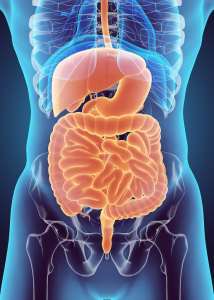Establishing an optimally functioning immune system goes beyond just taking immune stimulating herbs and supplements from your local health food store. There are numerous other factors that can play a role in immune health with the two biggest being your digestive health and stress.
Digestive Health

Your health starts with your gut. If your digestive system is off, that will disrupt your immune system as approximately 70% of your immune system lies in your digestive tract (1). Your gastrointestinal system is the gateway for pathogenic microbes and toxins as well as good bacteria and nutrients. If you are constantly being exposed to toxins, pathogenic microbes, foods that are bad for you or lots of antibiotics, which can wipe out your commensal flora, you may be predisposed to gastrointestinal infections and gut dysbiosis which activate the immune system leading to inflammation, potential damage to the intestinal mucosa, and increased permeability of the intestinal cells lining your gut (Leaky Gut).
Leaky gut encourages food proteins, that normally should be digested and not be able to cross the intestinal cell barrier, to present themselves to the gut-associated lymphoid tissue (GALT) and/or enter the bloodstream. Your immune system then can make antibodies to the food antigen (protein) and immune complexes can deposit in joints, skin, and other places in the body resulting in joint pain, skin rashes, fatigue, inflammation, brain fog, weight gain, and other symptoms (food sensitivities). Leaky gut can also predispose you to food allergies, some of which can cross react with environmental allergens. Sometimes, antibodies cross react with our body tissues and can attack them promoting autoimmune conditions. A commonly occurring one is gluten and Hashimoto’s thyroiditis, a thyroid condition, where gluten antibodies cross-react with proteins in the thyroid.
The constant stimulation of pathogenic microbes, toxins, and sensitive food proteins weakens your ability to fight colds and flus as the immune system is being burdened by the constant inflammation going on in your gut. Signs of poor digestive health that may be suggestive of leaky gut include bloating, gas, abdominal pains, constipation, loose stools, or abdominal cramping. Naturopathic medicine can help to restore your gut health by:
- helping you identify which foods you are sensitive to that might be triggering an immune reaction so you can remove the offending foods to reduce the burden on your immune system for a few months
- Establishing a healthy microbial balance in your gastrointestinal tract
- Healing leaky gut and reduce the inflammation
STRESS
![]()

Stress also has a negative impact on your digestive health and can indirectly contribute to leaky gut and inflammation. It also plays a huge impact on the ability of your immune system to protect you from viral and bacterial infections through hormonal actions. Stress (emotional or physical) releases a hormone known as cortisol. Cortisol has an immunosuppressive effect. This is why individuals who have transplant surgeries, have eczema, or psoriasis are given glucocorticoids like prednisone or hydrocortisone – to suppress the immune system, reduce inflammation, and in the case of transplants, prevent transplant rejection. This is also the reason why, when you have a big exam or 10 exams in a week and are stressed, you don’t actually get sick until after the exam period when you feel relaxed and your cortisol drops. This activates the immune system and the more damage the virus or bacteria has done during the period when you were stressed, the greater the immune response and the worse the flu symptoms.
Therefore, it is important to find ways to manage your stress and keep those cortisol levels down (but not too low, as it can create other symptoms). Herbs and supplements can be recommended to manage your cortisol levels and keep them within normal depending on where on the adrenal spectrum you lie. Each case is individual and requires a thorough assessment to determine which adrenal support is the best for you.
If you feel you could benefit from optimizing your digestive health or finding ways to manage the stress in your life, book your appointment and let's work together to achieve your health goals. Starting now is better than waiting until later - the longer the inflammation in the body persists, the higher the chance of other health problems developing like autoimmune diseases, joint pain, back pain, and, chronic fatigue.
Nutrients and Foods to Consume To Support the Immune System
- Zinc: essential for wound healing and has shown to decrease oxidative stress as well as some inflammatory markers. Zinc is also required for some immune cells from your innate immunity (1st line of defense) to function as well as encourage the growth and function of T and B cells (2).
- Food sources are oysters, red meat, chicken, beans, and nuts.
- Vitamin D: Supports your innate immunity by helping some immune cells increase their defense apparatus to combat bacteria; controls cell division and proliferation; reduces inflammatory mediators; it is also critical for autoimmune conditions as it reduces the proliferation and differentiation of B cells, lowers antibody secretion, decreases T cell proliferation, and, it also inhibits dendritic cell proliferation and maturation helping to create more self-tolerance rather than an immune response (3). Vitamin D also helps modulate T regulatory cells to balance TH1 and TH2.
- Unfortunately, food sources of vitamin D are few and supplementation is the best way. Some foods that are high in vitamin D are fatty fish, beef liver, and egg yolk.
- Vitamin C: Is needed for some immune cells, specifically macrophages and T cells to help combat pathogens.
- Food sources are citrus fruit, watermelon, tomatoes, red peppers, kale, Brussel sprouts, and broccoli.
- Vitamin A: This is integral to repairing our mucosal barriers in our intestine and respiratory tract following damage from an infection. Vitamin A is also required for optimal function of some cells from the innate immune system (1st line of defense) and it helps with TH cell and B cell development (4).
- Food sources: Beef liver contains vitamin A and green, leafy vegetables, sweet potatoes, carrots, broccoli, and squash contain beta-carotene which converts to vitamin A in your body.
REFERENCES:
- Vighi G, Marcucci F, Sensi L, Di Cara G, Frati F. Allergy and the gastrointestinal system. Clin Exp Immunol. 2008 Sept; 153(Suppl 1):3-6.
- Prasad AS. Zinc in human health: effect of zinc on immune cells. Mol Med. 2008 May-Jun;14(5-6):353-357.
- Aranow C, MD. Vitamin D and the immune system. J Investig Med. 2011 Aug;59(8):881-886.
- Stephensen CB. Vitamin A, infection, and immune function. Annu Rev Nutr. 2001;21:167-92.




2 Thoughts on “Digestive Health & Stress Affects Your Immune System”